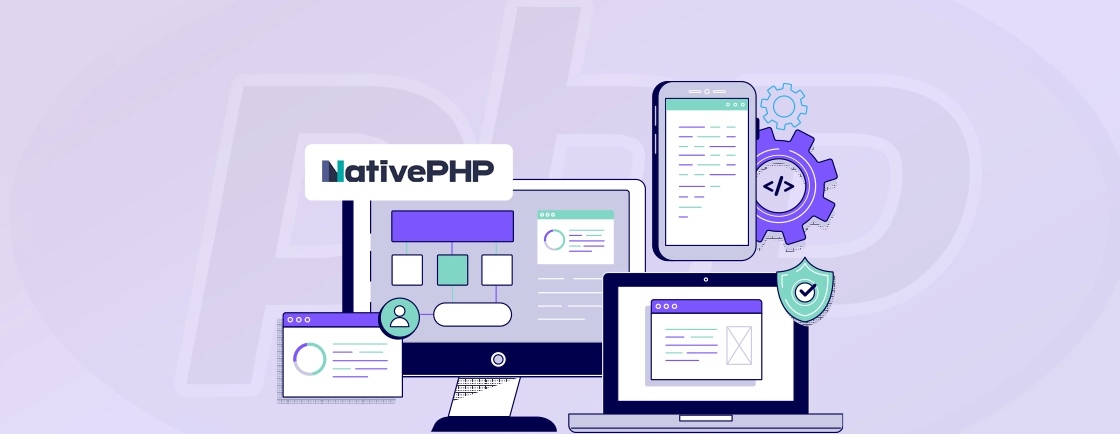Table of Contents
Launching a startup is a thrilling but challenging journey. Time is precious, resources are limited, and every decision carries significant weight. Choosing the right web technology becomes critical, shaping your development efficiency, security, and ultimately, your success. This is where PHP shines.
It offers an open-source nature, rapid development capabilities, and robust functionalities. These PHP functionalities help startups navigate the early stages with agility and effectiveness. Picture launching your Minimum Viable Product (MVP) quickly, growing efficiently based on user feedback, and scaling seamlessly as your business grows. This is the power of PHP in action.
In addition to its open-source nature and robust functionalities, PHP offers a multitude of features. We’ll explore several of them to help startups and benefit them with its robust offerings. So, let’s dive in.
Why is PHP Great for Startups?
PHP is one of the most competitive technologies to use for web development. It continues to thrive for startups with its unique combination of affordability, speed, and versatility. Fueled by its open-source nature, it grants access to a vast community and countless libraries. Additionally, its flexible architecture allows smooth scaling alongside your growing startup. Let’s understand each of its in-depth
1. Open-Source
Open-source software like PHP is the fuel that propels countless startups forward. But what exactly makes it so advantageous for your startup venture? Buckle up, because we’re diving into the core of open-source and how it empowers your startup journey:
- Cost-Effective. Open-source PHP grants you free access to its core code and a vast ecosystem of pre-built solutions. This translates to cost savings you can reinvest in your core product or marketing efforts.
- Innovative The open-source model fosters a vibrant community of developers. They constantly contribute, improve, and expand PHP’s capabilities. This means you benefit from a continuous flow of updates, bug fixes, and innovative features, all readily available for your project.
- Customization. Unlike closed-source solutions, PHP’s open nature allows you to tailor it to your specific needs. Need to modify a function or add a unique feature? Dive into the code and make it happen.
- Security. Open-source doesn’t mean vulnerable. With so many eyes looking at the code, security flaws are quickly identified and addressed. Additionally, the community contributes to security updates and patches, ensuring your application remains protected.
- Future-Proof. Open-source technology like PHP has a proven track record of longevity and adaptation. As your startup evolves, you can be confident that PHP will continue to grow and adapt alongside it.
The open-source advantage goes beyond just cost savings. Its offering of collaboration and empowerment fuels countless successful startups. Using PHP and its open-source community, you’re setting your venture on a path to success.
2. Prototyping
In the fast-paced world of startups, speed is everything. Transforming ideas into real prototypes quickly is crucial for validating concepts and evolving based on user feedback. That’s where PHP steps as your MVP (Minimum Viable Product) machine. Here’s why:
- Fast Development. PHP’s clean syntax and intuitive structure make it easy to learn and code. This translates to rapid development cycles, allowing you to turn ideas into prototypes in record time.
- Pre-Built Solutions. The vast ecosystem of PHP frameworks and libraries provides pre-built components for common functionalities. This saves you precious time and resources, allowing you to focus on the unique aspects of your MVP.
- Flexibility for Customization. While pre-built solutions are great, MVPs often require specific tweaks and customizations. PHP allows you to easily modify existing code or build your components.
- Iteration. MVPs are meant to be iterated upon. With PHP’s clean code structure and modular design, making changes and incorporating user feedback becomes a breeze.
Don’t underestimate the power of rapid prototyping in the startup world. By leveraging PHP’s speed, flexibility, and community support, you can build high-quality MVPs that validate your ideas and propel your startup towards success.
3. Frameworks
Building web applications from scratch can be daunting for a startup. That’s where PHP frameworks like Laravel and Symfony, and several others come in. Each of them offers pre-built structures and tools to streamline development.
- Laravel. It is renowned for its elegance and vast ecosystem. Laravel empowers you to build complex applications with ease. Its MVC architecture ensures clean code organization. While features like built-in authentication and authorization save you time and effort.
- Symfony. Need ultimate flexibility? Symfony offers a modular approach. It allows you to pick and choose specific components you need. This ensures your application is lean and optimized, without any unnecessary bloat.
- CodeIgniter. It shines with its small footprint and minimalist approach. CodeIgniter offers essential features without overwhelming complexity. This makes it ideal for smaller projects or when rapid development is key.
- Yii. Prefer an object-oriented approach? Yii provides a robust foundation for building well-structured. Its features and active community support make it a strong choice for projects requiring complex data models.
Choosing the right framework depends on your specific needs and project requirements. Consider factors like complexity, desired features, and team expertise when making your decision.
4. Libraries
In the domain of web development, PHP libraries work as secret tools. These pre-written code blocks offer a treasure trove of functionality. Thus, benefits save you time and effort while enriching your applications.
- Guzzle. Need to communicate with external APIs or services? Guzzle empowers you to make HTTP requests with ease. Its interface and features handle everything from basic GET requests to complex authentication and data parsing.
- Twig. Separating presentation logic from code is crucial for maintainable applications. Twig shines as a powerful templating engine. It allows you to create clean and reusable templates that integrate seamlessly with your PHP code.
- PHP Mailer. PHPMailer simplifies the process with its easy-to-use interface and robust features. From sending text emails to crafting HTML newsletters, it handles all your email needs efficiently.
These are just a few of the countless libraries available in the PHP ecosystem. Explore, experiment, and discover the ones that perfectly complement your project’s requirements. With the right libraries by your side, you can build feature-rich applications faster fueling your startup’s growth.
5. Database Integration
Data is the lifeblood of any modern application, and managing it effectively is crucial. PHP’s seamless database integration capabilities benefit here. It allows you to connect your startup’s applications to various databases with ease.
- MySQL. Often the go-to choice, MySQL is a popular open-source relational database management system (RDBMS). With extensive documentation, integrating with MySQL using PHP ensures smooth data storage.
- PostgreSQL. Need advanced features and scalability? PostgreSQL is an RDBMS that offers a wide range of capabilities. It includes complex data types and support for object-relational mapping (ORM).
- Eloquent ORM. If you’re using the Laravel framework, Eloquent acts as its built-in ORM. It simplifies complex queries and data manipulations.
- PDO (PHP Data Objects). PDO acts as a universal interface. It allows you to connect to various databases like MySQL, PostgreSQL, and more using a consistent API. This flexibility is ideal for startups exploring different options or planning for future growth.
The right database and integration method depends on your startup niche and project requirements. Consider factors like data volume, complexity, and future growth potential before making your decision.
6. Security
As your startup thrives, safeguarding user data and ensuring application integrity becomes crucial. Here’s how PHP security features secure your journey:
- Regular Security. PHP development follows a rigorous release cycle with frequent security updates. These updates address identified vulnerabilities and potential threats. Thus, helps you ensure your applications remain secure even as new attack methods emerge.
- Built-in Security. PHP comes equipped with various built-in security features like input validation, escaping mechanisms, and session management tools. These features help prevent common attacks like SQL injection and cross-site scripting.
- Secure Coding Practices. Beyond built-in features, adopting secure coding practices is crucial. This includes validating user input, escaping special characters, and using prepared statements for database interactions.
Security is an ongoing process. Stay informed about emerging threats, update regularly, and follow best PHP security practices to ensure your applications remain secure.
7. Flexibility
The startup landscape is dynamic, evolving rapidly with changing user needs and market trends. Your technology needs to adapt, and that’s where PHP’s flexibility works best. Here’s how it smoothes your journey:
- Modular Architecture. Like building blocks, PHP allows you to structure your application in modules. This modularity empowers you to easily add new features, modify existing ones, or swap modules entirely as your needs evolve.
- Seamless Integrations. The vast PHP ecosystem boasts countless libraries and tools for various functionalities. Need to integrate with a new payment gateway or social media platform? Chances are, there’s a pre-built solution waiting.
- Future-Proof Foundation. PHP constantly evolves and adapts to new technologies and standards. This ensures your technology foundation remains relevant and can seamlessly integrate with emerging tools and trends.
Remember, flexibility isn’t just about changing code. It’s about having the right foundation and mindset to use new technologies, integrate seamlessly, and adapt to a dynamic market. With PHP’s flexibility in your tech stack, your startup can navigate the ever-changing landscape with agility and innovation. For expert assistant, consult with a dedicated PHP web development company.
What are Common PHP Uses Cases for Startups?
From rapid prototyping to building full-fledged web applications, PHP is a versatile language ideal for startups seeking agility and affordability. Here are its key strengths:
1. Minimum Viable Products (MVPs)
Launch quickly and iterate efficiently with PHP’s rapid development pace and vast open-source libraries. Build lean prototypes that validate your ideas, secure funding, and gather crucial user feedback.
2. Content Management Systems (CMS)
Leverage the power of popular PHP-based CMS platforms like WordPress or Drupal to manage your website content with ease. No coding is required, allowing you to focus on creating engaging content.
3. E-commerce Platforms
Jumpstart your online store with robust PHP-powered platforms like Magento or PrestaShop. Manage products, process payments, and fulfill orders seamlessly, offering your customers a smooth and secure shopping experience. Scale effortlessly as your business grows without worrying about infrastructure limitations.
4. Custom Web Applications
Craft unique web applications tailored to your specific needs and vision. Whether it’s a customer portal or a social networking platform, PHP enables you to build solutions that perfectly align with your goals. Integrate seamlessly with third-party tools and services using APIs to further enhance functionality.
5. APIs and Integrations
Connect your application to a world of possibilities with PHP’s robust API integration capabilities. Access data from payment gateways or other services effortlessly, enriching your application’s functionality without reinventing the wheel. Streamline workflows and create valuable partnerships by establishing secure and efficient connections.
Conclusion
You’ve reached the final chapter in your exploration of PHP’s power for startups! Throughout this journey, we’ve unveiled its strengths: rapid prototyping capabilities, pre-built frameworks and libraries, and unparalleled flexibility. These attributes unlock incredible opportunities for your venture. It also empowers you to launch quickly, efficiently, and scale seamlessly as your business flourishes.
Remember, the power doesn’t stop here. The vast PHP community and ecosystem are your constant companions. They offer endless resources, ongoing support, and innovative solutions to fuel your growth. Consider this collaborative spirit, and you’ll unlock a world of possibilities. Ready to build a hihg performance site for your startup? Hire dedicated PHP developers today!
FAQs About Using PHP for Startups
Can PHP handle high traffic and large volumes of data?
Absolutely! While scalability is crucial for growing startups, PHP boasts proven capabilities in high-traffic environments. Popular platforms like Facebook and Wikipedia, powered by PHP, demonstrate its ability to handle millions of users and manage massive data.
How does PHP help with faster development and time-to-market?
Rapid development is a key advantage for startups. PHP’s clean syntax, vast open-source libraries, and pre-built frameworks save you time and resources. This accelerates your journey from idea to launch, enabling faster iteration and market entry.
Can PHP integrate with other technologies and platforms?
Integration is essential for modern applications. PHP excels in connecting with various tools and services. Its robust API integration capabilities allow seamless communication with social media platforms, payment gateways, and more.
Master PHP Web Development
Access expert guides and tips to enhance your PHP programming capabilities.





